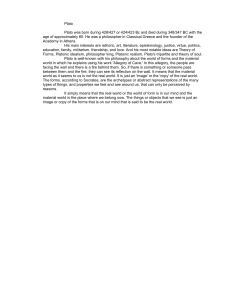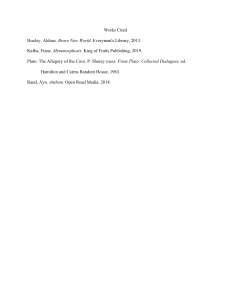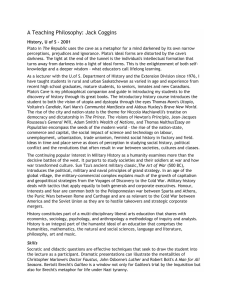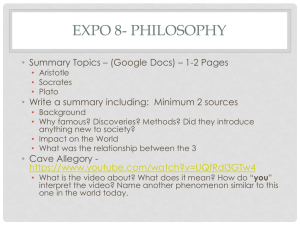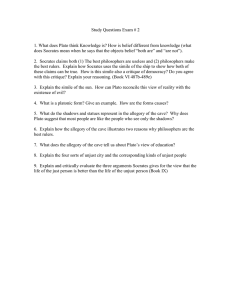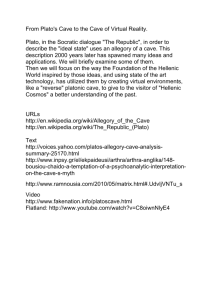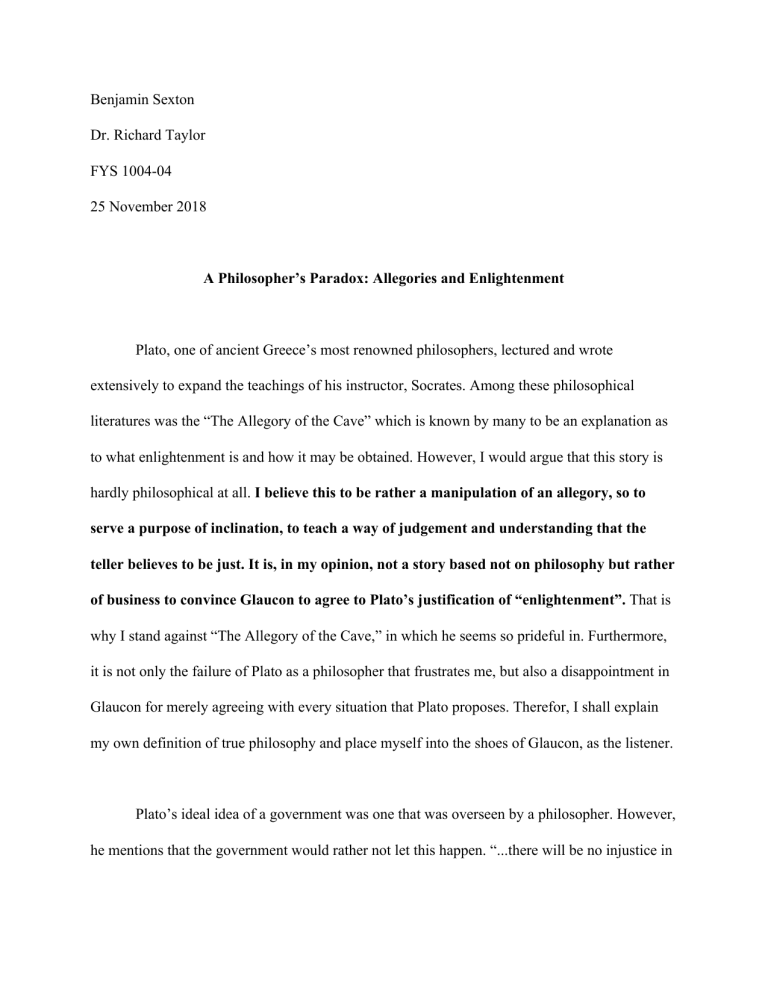
Benjamin Sexton Dr. Richard Taylor FYS 1004-04 25 November 2018 A Philosopher’s Paradox: Allegories and Enlightenment Plato, one of ancient Greece’s most renowned philosophers, lectured and wrote extensively to expand the teachings of his instructor, Socrates. Among these philosophical literatures was the “The Allegory of the Cave” which is known by many to be an explanation as to what enlightenment is and how it may be obtained. However, I would argue that this story is hardly philosophical at all. I believe this to be rather a manipulation of an allegory, so to serve a purpose of inclination, to teach a way of judgement and understanding that the teller believes to be just. It is, in my opinion, not a story based not on philosophy but rather of business to convince Glaucon to agree to Plato’s justification of “enlightenment”. That is why I stand against “The Allegory of the Cave,” in which he seems so prideful in. Furthermore, it is not only the failure of Plato as a philosopher that frustrates me, but also a disappointment in Glaucon for merely agreeing with every situation that Plato proposes. Therefor, I shall explain my own definition of true philosophy and place myself into the shoes of Glaucon, as the listener. Plato’s ideal idea of a government was one that was overseen by a philosopher. However, he mentions that the government would rather not let this happen. “...there will be no injustice in compelling our philosophers to have a care and providence of others; we shall explain to them that in other States, men of their class are not obliged to share in the toils of politics; and this is reasonable, for they grow up at their own sweet will, and the government would rather not have them” (Plato, 2000, page 6). Thus, he tries to convince Glaucon, using this allegory, that in order to rule effectively one must dwell in the darkness after enlightenment because only then will they see and administer truth. Plato’s truth was that the government was wrong in how it operated. I have no qualms about this interpretation but true philosophy, to myself, is something different. True philosophy, in my own definition, is the urge to gain and interpret knowledge without the satisfaction of using it. Now, though this interpretation seems quite out there, it is a far reach from skepticism. The main difference is an acceptance of that there is no true, correct answer to any situation. The concept of skepticism is to doubt ideas, concepts, and the algorithms of humanity simply to know the reason behind them and use it as a self-gratification. To philosophers, on the other hand, answers should never exist to be used by the thinker. To inquire to understand corresponds to both outlooks and it is needless to say that neither would be satisfied with even a thousand answers; however, the difference is that skeptics want justification to use a knowledge obtained, while the other absorbs said knowledge fully knowing that it is just a concept in which a situation could be placed. Skepticism feeds off of an anxiety of disbelief, but philosophy runs on curiosity. Philosophers themselves do not serve a purpose to guide individuals, but rather to inspire them. It is only right that a man’s mind be filled and his conscience left untouched. It is then when one may truly learn on their own and of their own interpretation of the world. To fill a man’s head with cleverness, is to lead him down the path of judgement and satisfaction. That is why I believe that Plato himself is a contradiction to this piece of work. Philosophy is meant to inspire others to think for themselves, yet Plato continuously interrogates Glaucon and compels him to agree with his philosophy. In “The Allegory of the cave,” Plato lectures his older brother, Glaucon, over the attainment of enlightenment. He sets the story with an imagery of the confinement of human beings inside of a cave of which they had been imprisoned in since childhood. They are positioned in a way that they can only see the wall in front of them and are shackled so that they cannot move their heads or body. Above and behind them is small fire and in between it and the prisoners is a raised walkway which is used frequently by passersby. A low wall is also built onto the bridge, to act as “the screen which marionette players have in front of them, over which they show the puppets.” (insert page number here) T he people who walk across the overpass carry a variety of objects; however, because the prisoners cannot directly see them, they are instead left to their imaginations to define the figures by the shadows on the wall. Plato explains that like ourselves, they only see the shadows of reality, in which the fire births from its light. Yet, there is one answer that never seems to appear nor question to rise. Who put them there? Clearly since Plato had said “since childbirth,” it means that they were not born there. Was it society? Was it the parents? Unfortunately we shall never know because Glaucon never thought to ask. I, however, think that the chains could represent the imagination of children. Perhaps after gaining the ability to think and ponder about the world, it is this that chains the young before they’ve given meaning to objects. Shadows don’t have value. A piece of gold is equivalent to dirt. A diamond is the same as a piece of fruit. There are no races nor disabled persons. There are just people. Shadows have shape, but they cannot be touched, fully identified, envied, or loved. They are all the same. Those who leaving into the outside world see the differences between people and begin to judge, but also learn what it means to be an individual. Another question I asked myself was, “What is it that creates shadows? Light. Then what does the fire that produces the light represent?” I’ve come up with the idea that the fire represents part of the soul. A child’s soul. To walk further with this idea, Plato later explains the release of a prisoner and the pain that his eyes suffer from looking towards the opening of the cave where the sun shines through. He justifies that the prisoner would turn away from the light and seek refuge in the shadows which comfort him. If someone were to tell him that he had been living in an illusion, would he not be perplexed and refuse to accept this reality? Would he not fancy the shadows that he had formerly saw as truth? Furthermore, if he were to be dragged up the ascent to face the sun entirely, would he not be blinded? To this, I agree with Plato. To be shown a truth far different than one’s own belief is maddening and perhaps even painful. However, what does the sun represent? I believe that the sun represents an adult’s soul. It is of one that has been through the pain of life. Another question unanswered is of whom forced the prisoner up to the opening of the cave? My answer to that is struggle, grief, anger, fear, everything that brings pain, but also causes growth. For a while the child’s soul is discarded as life progresses. As Plato (2000) explains, “He will require to grow accustomed to the sight of the upper world. And first he will see the shadows best, next the reflections of men and other objects in the water, and then the objects themselves” (page 2). That which shines through the darkness can be remarkably more beautiful than that which engulfs the darkness. “He will then gaze upon the light of the moon and the stars and the spangled heaven; and he will see the sky and stars by night better than the sun or the light of the sun by day” (Plato, 2000, page 2). This can be interpreted as that the prisoner will see the light that shines through the darkness better than the sun in the daytime. From this, I’d like to bring up is the correlation between shadows and light. Shadows cannot exist without both light and darkness. If there were only light then there would be only light and if there were only darkness then the same would apply. Furthermore shadows cannot be seen if one was looking directly at the light. This is why I believe the relationship between man and the soul is a bond of trust. The difference between a child’s soul and an adult’s is that there is an ever present balance between light and dark in the cave whereas in the upper world, day and night cause an imbalance, changing every second. What is enlightenment to a philosopher? I believe that, like a paradox, it is a never ending journey. To fully understand the world, however, one must incorporate both the soul of a child and one of an adult to see the world, not as an outsider, but one who lives within. They must know of both the balance of the cave and the imbalance, yet beauty, of the upper world and live in both. The cave is not a place of ignorance and denial, but yet of an innocence. Of course, this is only my interpretation of the allegory. I’m sure Plato’s version was mostly targeted towards a corrupt government, thus the difference. Nonetheless, a philosopher’s story, to me, should be one that inspires, not agitate, so that the listener can create their own image.

